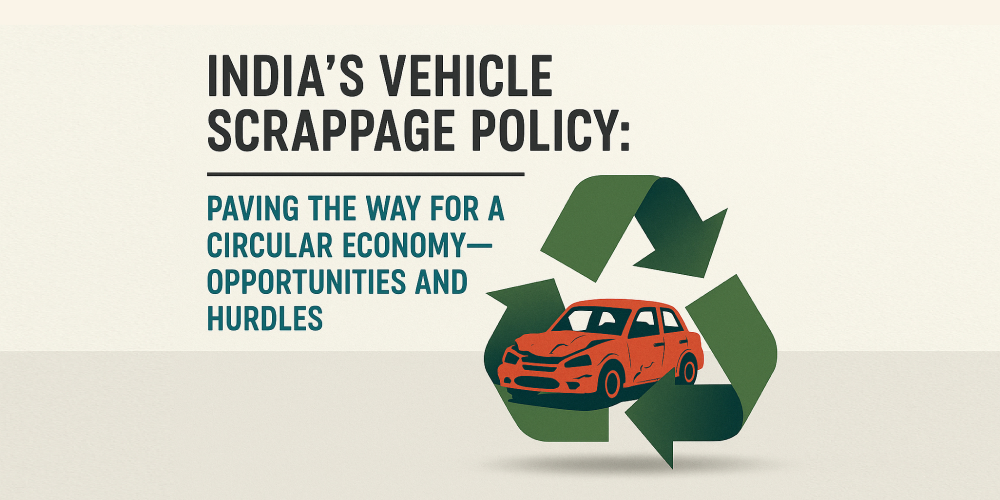
India’s Vehicle Scrappage Policy: Paving the Way for a Circular Economy—Opportunities and Hurdles
Stop Searching for "Junk Car Buyers Near Me" – Your Best Offer is Here!
India is at the cusp of a major transformation in its automotive sector. Driven by the need for cleaner air, safer roads, and a robust circular economy, the Central Government’s Voluntary Vehicle Fleet Modernisation Programme, commonly known as the Vehicle Scrappage Policy, is a landmark initiative.
This policy proposes to phase out old, polluting, and unfit vehicles, offering incentives for owners to replace them with newer, safer, and more fuel-efficient models.
As a Government Authorised Vehicle Scrapper, Vaahan Recyclers, proudly serving PCMC and all of Maharashtra, we are on the ground, witnessing this monumental shift. Here is our analysis of the opportunities and challenges presented by this ambitious policy.
1. The Opportunities: Fueling a New Automotive Ecosystem
The Scrappage Policy is far more than just retiring old vehicles; it’s a powerful catalyst designed to deliver a triple benefit: economic, environmental, and social.
A. The Economic Boost and New Industry
The policy is expected to inject significant momentum into the automotive and allied industries.
- Manufacturing Stimulus: Incentives for scrapping older vehicles drive demand for new ones, giving a much-needed boost to original equipment manufacturers (OEMs).
- Formalising Recycling: It creates a massive, organised industry for vehicle dismantling and recycling. This means new jobs and investments in Registered Vehicle Scrapping Facilities (RVSFs) like Vaahan Recyclers. The recycling of steel, aluminium, copper, and plastics ensures that valuable materials are reused, reducing dependence on imports and primary resource extraction.
- Consumer Incentives: Vehicle owners receive concrete benefits, including the scrap value from the old vehicle, a road tax rebate of up to 25% for non-transport vehicles, and a waiver of the registration fee for the new vehicle.
B. Environmental and Safety Advantages
The direct impact on air quality and road safety is perhaps the most critical benefit.
- Pollution Reduction: Older vehicles are disproportionately high polluters. By retiring them, the policy is expected to significantly reduce vehicular emissions, leading to cleaner air in metropolitan areas like PCMC and beyond.
- Resource Conservation: By ensuring that up to 95% of a scrapped vehicle’s material is recycled, the policy champions the principles of a circular economy.
- Improved Road Safety: Unfit vehicles pose a risk on the roads. Replacing them with modern vehicles featuring better safety standards (ABS, airbags, etc.) will contribute to fewer accidents and fatalities.
While the vision is clear, executing a policy of this scale in a country as vast and diverse as India presents several challenges that must be addressed.
A. Infrastructure and Compliance
The backbone of the policy is the network of authorised RVSFs.
- Setting up RVSFs: Establishing compliant, technologically advanced scrapping centres across the country requires substantial investment and streamlined regulatory clearances. For a state like Maharashtra, which has one of the highest numbers of registered vehicles, the need for fully compliant scrapers is paramount.
- Formalising the Informal Sector: India has a long-standing informal network of scrap dealers. Integrating this sector, while ensuring environmental compliance and safety standards, is a delicate balancing act.
- Logistics and Reach: Establishing an effective collection and transport network, especially in smaller towns and rural areas across Maharashtra, requires robust logistical planning.
B. Public Awareness and Adoption
The success of the Voluntary policy hinges on consumer buy-in.
- Valuation and Trust: Vehicle owners must be confident that they are receiving fair market value for their scrap vehicles. They also need assurance that the scrapping process is transparent and that the required documents, like the ‘Certificate of Deposit,’ are issued correctly to avail the incentives.
- Incentive Clarity: The complexity of the incentives (Scrap value, tax rebates, registration waivers) needs to be communicated clearly to encourage mass participation.
The seamless implementation of this national policy at the local level requires dependable, authorized partners.
As a Government Authorized Vehicle Scrapper operating out of PCMC and providing certified scrapping services throughout Maharashtra, Vaahan Recyclers is committed to:
- Compliance and Transparency: Ensuring the entire process, from vehicle intake to final dismantling, adheres to the strict regulatory and environmental guidelines set by the Ministry of Road Transport and Highways (MoRTH).
- Maximized Scrap Value: Utilizing advanced technology and efficient processes to ensure owners receive the best possible returns on their end-of-life vehicles.
- Hassle-Free Documentation: Providing the crucial ‘Certificate of Deposit’ needed for you to claim all government incentives on your new vehicle purchase.
The Vehicle Scrappage Policy is a necessary, progressive step towards a cleaner, safer, and more sustainable future for India. While challenges exist, the collective commitment of the government, automotive manufacturers, and authorised recyclers like Vaahan Recyclers will ensure this green transition is a success.
Ready to scrap your vehicle in Maharashtra? Learn more about the process, incentives, and how Vaahan Recyclers can help you retire your old vehicle responsibly.
The seamless implementation of this national policy at the local level requires dependable, authorized partners.
At Vaahan Recyclers, we proudly serve PCMC, Pune, Mumbai, Nashik, and across Maharashtra as a Government-Authorized Vehicle Scrapper.
We offer:
- Free vehicle pickup and inspection
- Transparent scrap valuation
- Instant Certificate of Deposit for incentives
- Eco-friendly vehicle dismantling process
Looking for a vehicle scrapper near you? Contact our PCMC center today.
The Vehicle Scrappage Policy encourages owners to scrap old and polluting vehicles in exchange for incentives and rebates on new purchases.
Only Government Authorized Vehicle Scrappers (RVSF) like Vaahan Recyclers are approved to dismantle and recycle vehicles legally and safely.
Owners receive scrap value, up to 25% road tax rebate, and registration fee waivers on the new vehicle.
After scrapping your vehicle at an authorized center, you’ll receive a Certificate of Deposit, which allows you to claim incentives.
Vaahan Recyclers offers pickup and documentation assistance across PCMC, Pune, and all of Maharashtra.
